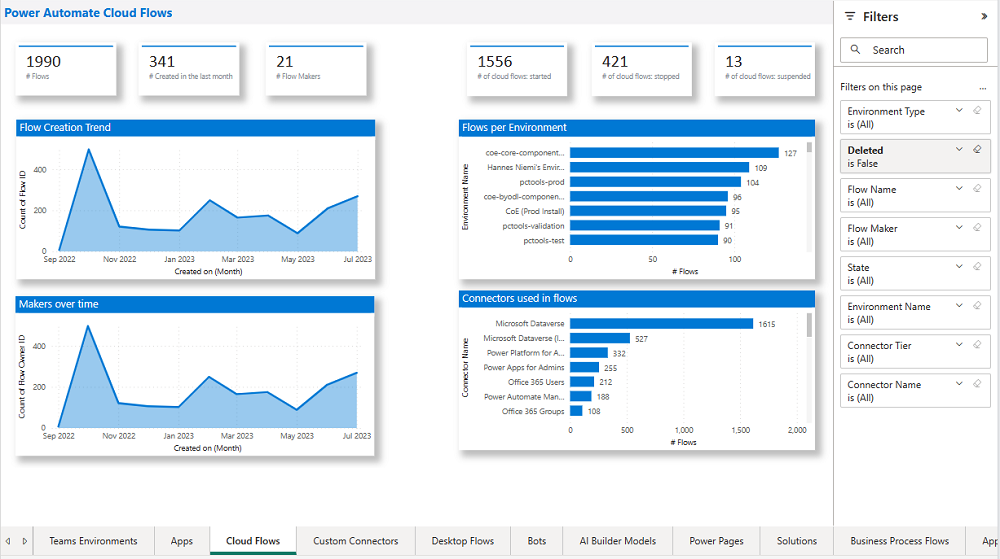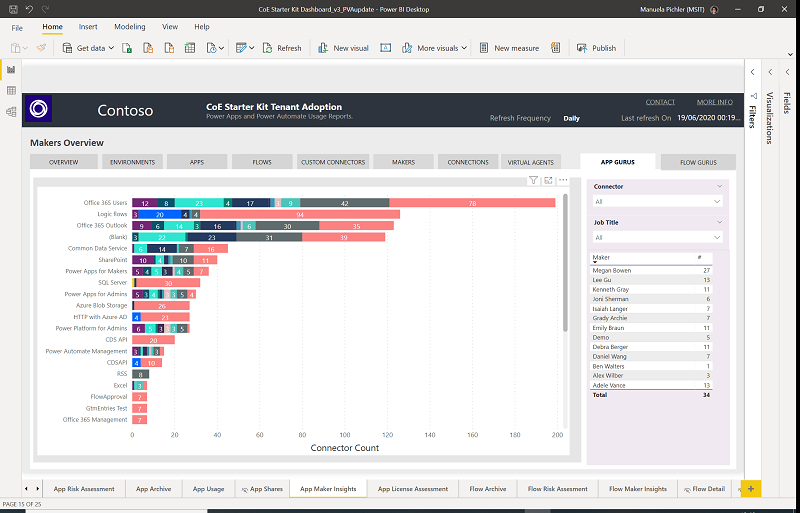Support Microsoft Power Platform champions in your organization
Champions are essential to driving awareness, adoption, and education in your organization. A champion is recognized by their peers as the go-to Power Apps, Power Automate, or Microsoft Copilot Studio expert. A champion continually builds and shares their knowledge even if it's not an official part of their job role. Power Platform champions influence and help their colleagues in many ways, including solution development, learning, skills improvement, troubleshooting, and keeping up to date.
Champions emerge as leaders of the community of practice who:
- Have a deep interest in Power Platform being used effectively and adopted successfully throughout the organization.
- Possess strong Power Apps, Power Automate, or Microsoft Copilot Studio skills as well as domain knowledge for their functional business unit.
- Have an inherent interest in getting involved and helping others.
- Are early adopters who are enthusiastic about experimenting and learning.
- Can effectively translate business needs into solutions.
- Communicate well with colleagues.
Tip
To add an element of fun, some organizations refer to their champions network as special agents or rangers. Microsoft has an internal community called Power Platform Ninjas.
Often, people aren't directly asked to become champions. Commonly, champions are identified by the Center of Excellence (CoE) and recognized for the activities they're already doing, such as frequently answering questions in an internal discussion channel or participating in lunch and learns.
Important
Someone very well may be acting in the role of a champion without even knowing it, and without formal recognition. The Center of Excellence should always be on the lookout for champions. CoE members should actively monitor the discussion channel to see who is helpful. They should deliberately encourage and support potential champions, and when appropriate, invite them into a champions network to make the recognition formal.
How will champions support you?
Champions will evangelize and help train their teams on the new ways of working. They build awareness, understanding, and engagement throughout the community.
They will:
- Create the enthusiasm that grows adoption of improved ways of working, and evangelize Microsoft Power Platform and its value across teams.
- Build a circle of influence among their teams, and help people in their circle understand what is in it for them.
- Bring new ways of working to life across teams.
- Identify business challenges and possible solutions.
- Provide feedback to the CoE team and sponsors.
Find your champions with the right tools
If you have Microsoft 365 in your organization, it’s likely some individuals already have discovered Power Apps through exploration and Power Apps popping up in Microsoft Teams, SharePoint, and OneDrive.
Check the tenant-level analytics in the Power Platform admin center or make use of the Center of Excellence Starter Kit dashboard to find your makers and learn about your app usage.
The dashboard part of the CoE Starter Kit can give you a tenant-wide overview of makers in your environment, and what connectors they're using to create apps and flows. You can see your top app and flow makers, what departments they are from, and identify trends over time.

You can see how many different connectors your makers are using and learn who is exploring different connectors. A great way to identify mature makers is looking at those who try out different connectors.

Tip
Even if your organization hasn't adopted Power Platform yet, it’s likely you already have a good idea of who your champions will be. They are your Excel, Access, and SharePoint whizzes; or maybe they’re the troublemakers pushing the boundaries; or the ones who are first in line when there’s something new to learn. They question, they query, they encourage. Train those people. Make them Power Platform champions and help them train others—champions aren't only passionate about what they do, but are also excited to evangelize and help their peers to learn more effective ways of working.
Create a champions program
Considerations and key actions you can take to initiate, grow, and sustain your champions network include:
Plan your program
- Design and align the champions community to organizational objectives and vision for Microsoft Power Platform in your organization. Attain sponsorship from key stakeholders and executives.
- Create a plan to support the champions network. Although some aspects of a champions network will always be informally led, determine to what extent the CoE will purposefully cultivate and support champion efforts throughout individual business units.
- Decide what level of commitment and expected time investment will be required of Power Platform champions. (Note that the time investment can vary wildly from person to person, and team to team.) Plan to clearly communicate expectations to people who are interested to get involved. Obtain manager approval when appropriate.
- Determine how you will respond to requests to become a champion, and how the CoE will seek out champions. Decide if you will openly encourage interested employees to self-identify as a champion and ask to learn more (less common). Or, whether the CoE will observe efforts and extend a private invitation (more common).
- Determine how membership of the champions network will be managed. It could be implemented through membership in a security group.
- Be clear about program requirements: Some champion programs require that members attend the monthly meetings, hold office hours for the group of users they support, and provide training to new users. Whatever your requirements, make sure that champions are clear on how to successfully participate in the program.
Consider how champions will communicate with you and each other
- Decide how you will communicate with the champions network (for example, in a Teams channel, a Yammer group, and/or an email distribution list).
- Determine how the champions network will communicate and collaborate with each other directly (across organizational boundaries), to share updates and successes, and to connect with each other.
- Hold regular meetings: Promote enthusiasm and cohesiveness of your community by holding regular monthly meetings. These can be a combination of in person and virtual meetings, but their consistency is key to having a thriving champions community.
- Create a Champions team: Your champions should use the team you have setup for them for all program communications, feedback, and to find resources. In doing this they will become increasingly familiar with the product and its benefits. Get started with the Adopt Office 365 teams template, which will create relevant channels and apps for your champions program.
Focus on the people
Find enthusiastic champions who can commit time and effort. How can you help them, how can you unblock challenges, how can you celebrate them?
- Provide materials ready to support their work (for example, access to training material and templates).
- Ensure a regular rhythm for discussions with the champions on what’s working and what’s not.
- Encourage the sharing of stories, either through show-and-tell sessions or regular newsletters. You can lean on our best practices to share success stories for ideas on how to structure those stories.
- Recognize and reward the work champions are doing. Remember, they're not a support team but business representatives.
Shape the future of your CoE with Champions
- Ensure champions have the resources they need, including:
- Direct access to CoE members.
- Influence on environment and connector strategies being implemented (for example, requirements for a dataset certification policy).
- Influence on the creation of best practices and guidance (for example, providing recommendations for which connectors should be available via Data Loss Prevention (DLP) policies).
- Actively involve certain champions as satellite members of the CoE. They can provide valuable input in what works and doesn't work when it comes to admin and governance policies, communication and training.
- Create a feedback loop so champions can easily provide information or submit suggestions to the CoE.
Rewarding champions
Your champions will give you important insights into the progress and potential pitfalls of your project. Routinely provide recognition and incentives for champions. Not only is praise an effective motivator, but the act of sharing examples of successful efforts can motivate and inspire others.
Incentives that champions find particularly rewarding can include:
- More direct access to the CoE: The ability to have connections in the CoE is valuable.
- Champion of the month: Publicly thank one of your champions for something outstanding they did during the previous month. It could be a fun tradition at the beginning of a monthly lunch and learn.
- A private experts discussion area: A private area for the champions to share ideas and learn from each other is usually highly valued.
- Specialized or deep dive information and training: Access to additional information to help champions grow their skillsets (as well as help their colleagues) will be appreciated. It could include attending advanced training classes, privileged access to relevant events, or speaking engagements.
- Is there a company reward or benefit program that their work could tie into? Are there vouchers or other goodies they could receive? Could the benefit even be a premium license or their own environment to play in?
Maturity levels
The following maturity levels will help you assess the current state of your community of practice:
| Level | State of Power Platform community |
|---|---|
| 100: Initial | Some content creators do great work, but their efforts are unrecognized.Efforts to share knowledge are rare and unstructured.Some staff may have attended App in a Day events (Partner or Microsoft delivered).Team-based initiatives for nurturing makers. |
| 200: Repeatable | On-boarding strategy for new makers.Makers become ambassadors across their departments and evangelize the capabilities.Some staff have participated in a hackathon.Makers become ambassadors across their departments and evangelize the capabilities. |
| 300: Defined | Makers provide insights into business pain points.Knowledge sharing in multiple forms is a normal and regularly scheduled occurrence.Training and upskilling strategy for makers.Internal Champions community.CoE Starter Kit – Nurture Module adopted. |
| 400: Capable | Regular events for Champions.Regular hackathons.Maker assessments and certificates.Sharing and celebrating success stories.Show & Tell sessions.Adoption campaign. |
| 500: Efficient | Large internal community with proven value.Career path for makers.Community of mentors.Common development strategy and goals for Citizen and Pro developers. |
Feedback
Coming soon: Throughout 2024 we will be phasing out GitHub Issues as the feedback mechanism for content and replacing it with a new feedback system. For more information see: https://aka.ms/ContentUserFeedback.
Submit and view feedback for